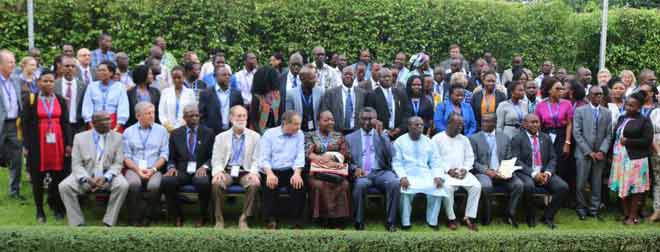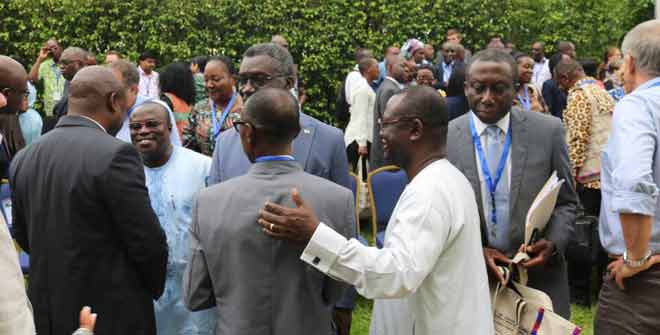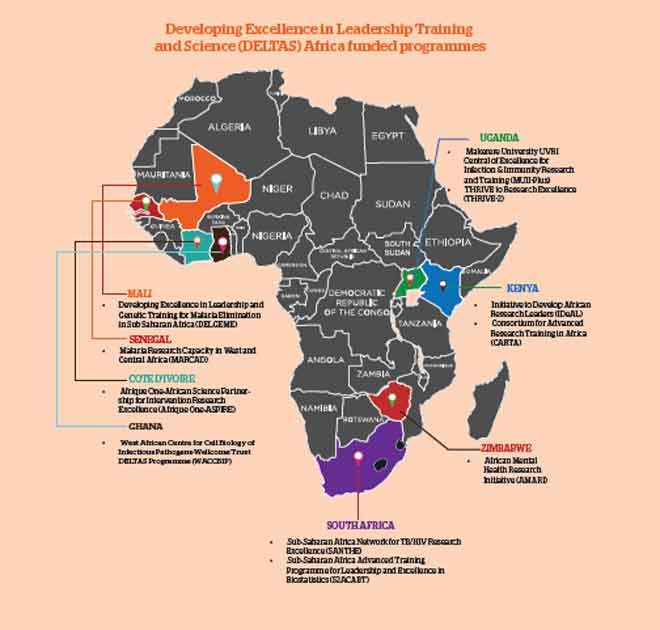
African scientists meet in Accra at DELTAS17 to exchange information
Established and emerging African health research leaders, policymakers, representatives of partners and funders, and other African and international guests from various countries met in Accra this week for an exchange of information on research being done by African scientists.
Organised under the theme, “Showcasing the best so far,” by the Developing Excellence in Leadership, Training and Science (DELTAS) Africa, the meeting brought together about 170 present grantees together with funders and other stakeholders to build a stronger DELTAS Africa community.
The DELTAS Africa programme, is a scheme initiated by the Wellcome Trust in partnership with Alliance for Accelerating Excellence in Science in Africa (AESA) and other partners, to support African-led development of world class researchers and researcher leaders.
It is a long-term programme, over an initial period of five years (2015-2020), with the aim to support collaborative teams to conduct health research, offer training fellowships and mentorship, and invest in research infrastructure.
 A group photograph of some of the delegates at the meeting.
A group photograph of some of the delegates at the meeting.
Funded programmes
DELTAS Africa funded programmes are currently in Ghana, Cote d’Ivoire, Senegal, Mali, Uganda, Kenya, Zimbabwe and South Africa.
The meeting in Accra, which was the second annual meeting presented an opportunity to highlight some ground-breaking research being done by African scientists to address the continent’s health and developmental challenges.
Prof Kwabena Frimpong-Boateng, Minister of Environment, Science, Technology and Innovation, Ghana gave an opening key note address which touched on his “Life Journey from Cardiovascular Miracles to Political Leadership.”
{youtube}COpa7sHEBGI{/youtube}
Later in an interview with journalists, Prof Frimpong-Boateng lauded moves aimed at increasing funding for research and development to one percent of GDP by the Ghana government.
According to him, the move by the Nana Addo Dankwa Akufo-Addo led government which was in line with what the African Union (AU) has proposed is very laudable and would enable the country to make a headway in science and development.
“So far the amount of money dedicated to research and development is just about 0.025 percent of GDP,” he said.
“But our president Nana Addo Dankwa Akufo-Addo has promised to increase it to one percent in accordance with what AU says. And I think we will not even stop there, in future when we get some more money we will increase it.”
He noted that the poverty gap was the technology gap, “we cannot sit here and not do things for ourselves.
“If 100 percent of our development budget is from outside sources, 80 percent of inputs into agriculture, education and health is from outside, then we can’t survive as a nation, it is not sustainable, so we need to work hard, generate wealth, stop the corruption and change our attitude and thinking that it will only take Ghanaians to build this nation, on the other hand, it will take Ghanaians to destroy our nation,” Prof Frimpong Boateng noted.
Explaining, he said, “first of all we have to create wealth, generate wealth, and we can do that when we work hard and we should minimise corruption. The money that goes into the corruption industry in Africa is too much, ranging from 20 percent to 75 percent. I don’t know the percentage in Ghana.
A special lecture from Nobel Laurate and molecular biologist, Peter Agre was expected to be delivered at the meeting.

Message from AESA
Welcome to the 2nd Annual Meeting of DELTAS Africa.
DELTAS Africa research teams – students, fellows, technicians, administrators and principal investigators – represent the best talent pool of scientists from across the continent working in research for health and related inter- and trans-disciplinary areas. This is reflected in the theme of this year’s Annual Meeting - ‘DELTAS Africa, showcasing the best so far’.
AAS/AESA in partnership with the University of Ghana are proud to gather together more than 170 guests who include established and emerging African health research leaders, policymakers, representatives of our partners and funders, and our African and international guests. We are all keen to engage in productive conversations over five days, on how science can enable Africa to meet its health and developmental challenges.
The First DELTAS Africa Annual Meeting was held in July 2016 in Nairobi, Kenya. It provided a critical opportunity to network and advance the implementation of these ambitious programmes, managed by AESA and funded at a level of $100M by the Wellcome Trust and DFID.

At that inaugural meeting, the foundation was laid for a fundamental framework for DELTAS Africa premised on the DELTAS Africa Theory of Change and four strategic focus areas i.e. achieving world class outputs in terms of scientific quality; training the next generation of scientific leaders; linking research to policy and practice through scientific citizenship; and building robust and vibrant research environments.
These key areas are underpinned by strong governance structures including leadership provided by the 11 DELTAS Africa programme directors; a well thought out M&E framework; and grant terms conditions and management policies overseen by the AAS/AESA team; and strategic support from the Wellcome Trust teams.
As we will witness from the presentations and discussions at this meeting these approaches are yielding the desired results. The inaugural meeting in Nairobi was mostly about setting the foundation for DELTAS Africa and was dominated by discussions on the governance structures. This meeting in Accra will be the first opportunity for a cohort of newly recruited scientists, fellows and trainees to showcase the scientific work that is now being undertaken across the 11 consortia.
While DELTAS Africa is anchored on the AESA mission of supporting people, their places of work and their programmes of research and innovation, capacity building is not an end in itself.
The ultimate goal for DELTAS Africa and other AESA programmes is to produce data and evidence that leads to products, policies and clinical practices that engender better lives and livelihoods in Africa.
In this beautiful setting of Accra, we can collectively review progress and shape the next set of key activities through our strong networks, collaborations, resource sharing, and all the elements that make up the DELTAS Africa community of research practice. In doing so, questions such as ‘how do we translate our joint experience into increasing our effectiveness and efficiency in implementing our respective DELTAS Africa agendas?’ are paramount.
The science of DELTAS Africa is ultimately for the benefit of society, so this is an opportunity to discuss innovative approaches to research management, scientific communication and publishing, learning and evaluation, and how we accelerate public, policy and community engagement.
We extend a warm welcome to all participants and eminent guests joining us from around the world. Your participation is a strong message that you believe in the future of science in Africa and it is an inspiration and encouragement especially to young Deltoids that indeed they can look forward to living, working and scientifically thriving in Africa.
Tom Kariuki, Interim Executive Director, AAS, & AESA Director
Alphonsus Neba, Programme Manager, DELTAS Africa AAS/AESA
Gordon Awandare, Director, WACCBIP University of Ghana
Message from the AESA Partners Group
Dear Deltoids,
It is a privilege to have followed the development of the DELTAS Africa concept, to see it approved and funded, the consortia selected, DELTAS Africa handed over to AESA, the Fellows recruited and to know that you, the living, breathing community of Deltoids are gathering in Accra to energise yourselves as a powerful force for African-led research.
The richness of the Accra programme is testament to the depth of rigour and intellectual leadership that AESA has brought to leading this programme.
Tom Kariuki’s team is here in force with an agenda that will test and enrich all of us and strengthen the collaborative bonds between fellows, consortia and friends of DELTAS.
The long-term success of the DELTAS programme, and re-funding depends on you. So I am going to give you three nudges!
One: The programme is underpinned by the fellows at Masters, PhD and Post-doctoral levels. It is your research output and for progress that ultimately will determine if Wellcome and DFID’s investment has advanced research and training on the African continent. Take advantage of all the help you can get from AESA and your mentors and be impatient for success.
Two: We want to see you establish research environments that evolve into the critical mass and physical infrastructure that will attract and retain more researchers like yourselves. And we need you to be out there, using your data, your skills and intellect to influence policymakers and engage the public, changing health practice and increasing the numbers of people who “get” science.
These areas were neglected in the recent DELTAS Africa reports and this is a big nudge and could be a big gap in your output midterm reviews next year.
Simon Kay
Chair, AESA Partners Group &
Head of International Programmes and Partnerships
Wellcome Trust
Writer's email:
